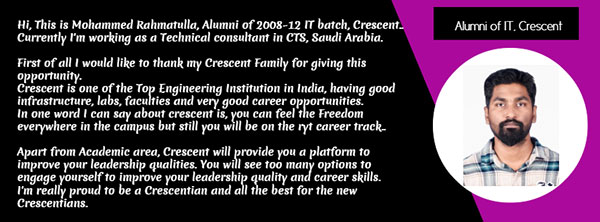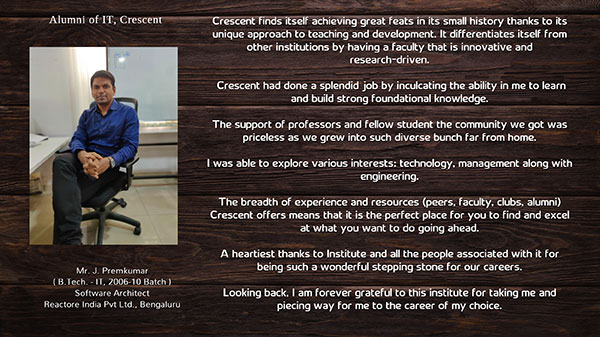B.Tech. Information Technology
B.Tech. Information Technology
Eligibility
Fee Structure
Program Details
Eligibility
For NRI / Foreign National Candidates
Candidates should have completed 12 years of schooling (equivalent to 10+2 system of Indian education, CBSE, ISC etc.) with Physics, Chemistry and Mathematics as subjects of study. The candidates should have minimum average of 50% marks in Physics, Chemistry and Mathematics.
- English as one of the subjects of qualifying examination.
- Candidates completed A Levels, IB, STPM, HSC, WASSCE, NCEA Level 3, American High School Diploma, etc. with minimum 50% aggregate or equivalent grade in Physics, Chemistry and Mathematics and a pass in English.
- Candidates studied under American High School system are eligible, if the above courses have been studied in the 11th and 12th grades or ‘AP’ (Advanced Placement) courses.
- The date of birth should be between January 2004 and December 2009.
Fee Structure
Admission 2025-26
Tuition fee can be paid in two instalments in a year (semesterwise)
| Programme | Tuition Fee Per Year (USD) based on Percentage of Marks in Physics, Chemistry & Maths in 12th Standard Exam | Amenities and Service Fee (USD) (One–time) | ||||
|---|---|---|---|---|---|---|
| 90% and above | 80 to 89.99 % | 70 to 79.99% | 60 to 69.99% | Below 60% | ||
| B. Tech. Information Technology (4 years) | 2500 | 3000 | 4000 | 5000 | 6000 | 500 |
Program Details
Admission Brochure
Programme Educational Objectives
The Programme Educational Objectives for students of B.Tech – Information Technology Programme within the first few years after graduation are that they will
- have core competence in mathematics, science and engineering concepts essential to formulate, analyze and solve hardware / software engineering problems
- possess good breadth of knowledge in the core areas of information technology and related engineering so as to comprehend engineering trade-offs, analyze, design and synthesize data and technical concepts to create novel products and solutions for the real time problems
- use tools and techniques for software development in different application domains and to grow as an entrepreneur.
- apply their knowledge and multifaceted skills to get immediate employment and excel in IT professional careers or awareness of the lifelong learning needed to continue their education in IT or related post graduate programmes to perform excellence, leadership and demonstrate good citizenship.
- maintain high professionalism and ethical standards, effective oral and written communication skills, to work as part of teams on multidisciplinary projects and diverse professional environments, and relate engineering issues to the society, global economy and to emerging technologies.
Programme Outcomes
On successful completion of the programme, the graduates will be able to:
- apply the knowledge of mathematics, science, engineering fundamentals, and an engineering specialization to the solution of complex engineering problems
- identify, formulate, review research literature, and analyze complex engineering problems reaching substantiated conclusions using first principles of mathematics, natural sciences, and engineering sciences
- design solutions for complex engineering problems and design system components or processes that meet the specified needs with appropriate consideration for the public health and safety, and the cultural, societal, and environmental considerations
- use research based knowledge and research methods including design of experiments, analysis and interpretation of data and synthesis of the information to provide valid conclusions
- create, select, and apply appropriate techniques, resources, and modern engineering and IT tools including prediction and modeling to complex engineering activities with an understanding of the limitations
- apply reasoning informed by the contextual knowledge to assess societal, health, safety, legal and cultural issues and the consequent responsibilities relevant to the professional engineering practice
- understand the impact of the professional engineering solutions in societal and environmental contexts, and demonstrate the knowledge of, and need for sustainable development
- apply ethical principles and commit to professional ethics and responsibilities and norms of the engineering practice
- function effectively as an individual, and as a member or leader in diverse teams, and in multidisciplinary settings
- communicate effectively on complex engineering activities with the engineering community and with society at large, such as, being able to comprehend and write effective reports and design documentation, make effective presentations, and give and receive clear instructions
- demonstrate knowledge and understanding of the engineering and management principles and apply these to one‘s own work, as a member and leader in a team, to manage projects and in multidisciplinary environments
- recognize the need for, and have the preparation and ability to engage in independent and life-long learning in the broadest context of technological change
Programme Specific Outcomes
- design and conduct experiments for organizing, analyzing, interpreting data to develop skills related to information retrieval
- identify, formulate and solve computing problems using appropriate tools & techniques to meet industrial and societal needs in different domains
Alumni Testimonial
 Md Rahamatulla – CTS (IT 2008-12)
Md Rahamatulla – CTS (IT 2008-12) Punitha – Infosys – IT Alumni 2008-12
Punitha – Infosys – IT Alumni 2008-12 Naveen Kumar – Valeo – IT (2008-12)
Naveen Kumar – Valeo – IT (2008-12) Premkumar – Reactore (IT 2006-10)
Premkumar – Reactore (IT 2006-10) Md Zahid – MOE -SG (IT 2006-10)
Md Zahid – MOE -SG (IT 2006-10) Devanand – Infosys (IT 2008-12)
Devanand – Infosys (IT 2008-12)








